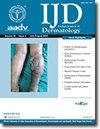Association between Isotretinoin Exposure and Inflammatory Bowel Disease: A Nationwide Case-Control Study in South Korea.
IF 1.3
4区 医学
Q4 DERMATOLOGY
引用次数: 0
Abstract
Context Isotretinoin is commonly prescribed for the treatment of acne. However, its association with inflammatory bowel disease (IBD) could not be confirmed due to inconsistencies in the literature. Furthermore, no related study has been conducted on an Asian population. Aims The aim of this study was to investigate the association between isotretinoin and inflammatory bowel disease. Methods and Material A nationwide, population-based, case-control study using the National Health Insurance Service database of South Korea was conducted. The case group comprised 107,434 patients with IBD, while the control group comprised 393,830 patients who were matched using a 1:4 propensity score. Data on isotretinoin exposure within the previous 5 years were extracted, and a multivariable-adjusted, conditional, logistic, regression analysis was performed. Results After adjusting for age, sex, underlying disease, the Charlson co-morbidity index, and tetracycline use, a significant association between isotretinoin exposure and IBD was found, with an odds ratio of 1.20 (95% confidence interval, 1.10-1.30). Furthermore, the association appeared to become stronger with longer exposure, more of a cumulative dose, and a longer time since the first exposure. When analyzed separately for ulcerative colitis and Crohn's disease, isotretinoin exposure was significantly associated with both diseases. Conclusions Our study reveals a dose-response relationship between isotretinoin exposure and IBD risk in an Asian population. Healthcare professionals should be aware of the association and consider alternative medications for acne treatment, particularly in patients who are at a higher risk of developing IBD.异维A酸暴露与炎症性肠病之间的关系:韩国全国病例对照研究》。
背景异维A酸是治疗痤疮的常用处方药。然而,由于文献资料的不一致,异维A酸与炎症性肠病(IBD)的关系尚未得到证实。本研究的目的是调查异维A酸与炎症性肠病之间的关系。方法和材料 本研究利用韩国国民健康保险服务数据库开展了一项全国性、基于人群的病例对照研究。病例组由 107,434 名 IBD 患者组成,对照组由 393,830 名患者组成,采用 1:4 的倾向评分进行匹配。结果在对年龄、性别、基础疾病、查尔森共病指数和四环素使用情况进行调整后,发现异维A酸暴露与IBD之间存在显著关联,几率比为1.20(95%置信区间,1.10-1.30)。此外,这种关联似乎随着接触时间的延长、累积剂量的增加以及首次接触时间的延长而变得更强。在对溃疡性结肠炎和克罗恩病进行单独分析时,异维A酸暴露与这两种疾病均有显著相关性。医疗保健专业人员应了解这种关联,并考虑使用替代药物治疗痤疮,尤其是对罹患 IBD 风险较高的患者。
本文章由计算机程序翻译,如有差异,请以英文原文为准。
求助全文
约1分钟内获得全文
求助全文
来源期刊

Indian Journal of Dermatology
Medicine-Dermatology
CiteScore
1.80
自引率
0.00%
发文量
217
审稿时长
47 weeks
期刊介绍:
The journal publishes information related to skin-pathology and different modes of therapeutics, including dermatosurgery and cosmetic dermatology. Likewise, it carries articles on leprosy, STI and HIV/AIDS. The editorial board encourages the authors to publish articles addressing emerging techniques and developments in the subject specialty, in the form of Original investigations, Narrative and Systematic Reviews as well as Case Reports. The journal aims at publishing Editorials and Commentaries from eminent personalities on a regular basis.
 求助内容:
求助内容: 应助结果提醒方式:
应助结果提醒方式:


